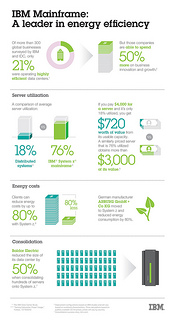IBM today announced that ARBURG GmbH + Co KG, a leading manufacturer of injection molding machines used to make plastic products, reduced its energy consumption for servers by 80 percent and for storage by 25 percent with its new IBM infrastructure.

ARBURG serves a broad range of customers across the automotive, electronics, packaging, medical equipment, and consumer goods sectors in some 100 countries worldwide. ARBURG’s IT environment grew along with its business, but was too complex and not able to support the manufacturer's goals.
In collaboration with IBM, ARBURG upgraded to the new IBM zEnterprise 114 mainframe to drive down costs and accelerate its time-to-market in order to improve customer satisfaction -- without compromising on product quality.
“With IBM zEnterprise, ARBURG is able to make better use of the large amounts of data generated daily across our core business areas of development, procurement, production, sales and services,” said Andreas Dümmler, Director of Information Systems, ARBURG. “Our company now has the insights and flexible infrastructure we need to better respond to the demands of our customers and bring our products to market faster.”
To support its full SAP application environment, ARBURG runs two IBM z114 mainframes with IBM System Storage DS8800, IBM DB2 and IBM Tivoli Monitoring solutions.
“By migrating to the latest generation IBM zEnterprise 114 server we have reduced our energy consumption by 80 percent. Likewise, implementing the IBM System Storage DS8800 storage solution cut power consumption for IBM zEnterprise disk storage by 25 percent,” continued Dümmler.
ARBURG also runs applications on IBM System x servers with IBM System Storage SAN Volume Controller and IBM Storwize V7000 systems. By consolidating on to IBM System x servers with virtualization, ARBURG shrunk its number of physical servers by more than 50 percent and lowered energy requirements by 60 percent.
The company can leverage IBM Easy Tier technology built into the Storwize V7000 to dynamically and automatically migrate data between spinning drives and solid state drives (SSDs), moving the most-accessed data to SSDs for better performance and the less-used data to lower-priced, standard drives.
ARBURG says its IBM infrastructure will allow it to grow its SAP environment gradually without the need to frequently invest in new hardware -- saving money, minimizing complexity and maximizing performance.
The company’s long-term strategy is to use its SAP solutions running on IBM technology to optimize processes and improve transparency and quality, leading to shorter product development cycles and reduced time-to-market.